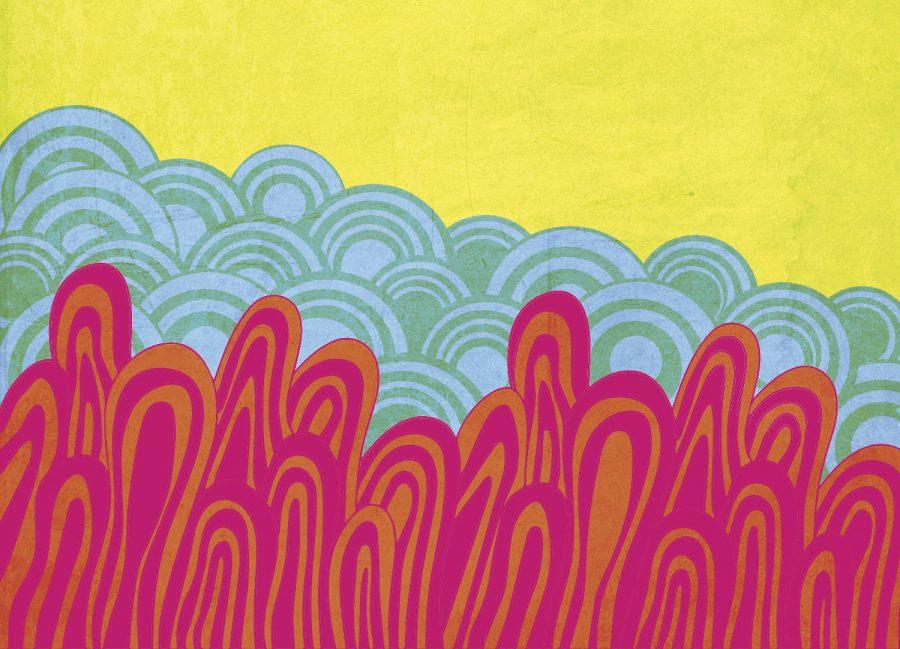Rise of Psych Rock: Bipolaroid, Druids lead emerging scene in New Orleans
October 19, 2016
New Orleans’ rock community has flourished for decades, though the city historically has roots embedded in jazz and blues music. In comparison, the presence of psychedelic rock in New Orleans has developed only recently.
Psychedelic rock, inspired by hallucinogenic drug-induced experiences, dates back to the mid-’60s when Pink Floyd, The Doors, The 13th Floor Elevators, Jimi Hendrix and many other groups emerged. More popular bands such as The Beatles and The Beach Boys experimented with psychedelia as well.
The genre typically employs heavy, distorted instrumentals through specific guitar pedals, electronic keyboards, synthesizers and studio effects like reverb, phasing and delay loops.
“Obviously I don’t know what the ’60s and ’70s were actually like. I can hear about that from my parents or other people, but I won’t really know what it is or I can’t know for sure,” sophomore Gabe Hollander said. “But I sort of feel like this weird nostalgic vibe from [psychedelic rock] and it puts me in that place sometimes.”
The well-known contemporary band Tame Impala, and its offshoots like Pond and Mink Mussel Creek, come from Perth, Western Australia. Such bands are considered psychedelic rock but have shifted stylistically.
“I feel it’s hard to just classify something as psychedelic rock versus all the things that take influence,” Hollander said. “You see all these things that exist that are inspired by this predecessor: real psychedelic rock.”
Bipolaroid and Druids are two New Orleans bands classified as psychedelic rock, despite their differences in style and musical influence. Bipolaroid, headed by singer, songwriter and guitarist Ben Glover, surfaced in March 2002. Psychedelia makes his music unconfined, yet difficult to categorize.
“You’re always trying to expand the music and change it and make it better and different,” Glover said. “It never has to be the same thing consistently ever.”
Members have come and gone, but influences like Pink Floyd, Syd Barrett, The Pretty Things and Dr. John remain. These influences are evident in, for example, “Wolfmother” from Bipolaroid’s fourth album “Twin Language.” New Orleans was influential as an incubator of creative work over Glover’s 17 years in the city.
“There’s always been, even outside of rock and psychedelic rock … somebody [is] doing something shocking here,” Glover said. “We started absorbing more of the locality by the third record. Maybe some of it was intentional.”
In contrast, Druids is a younger band that began in October 2014. Its influences include King Gizzard and the Lizard Wizard, Wand, The Wytches and Black Sabbath.
“We are a psychedelic rock band with strong elements of punk music, garage rock and even some proto-metal,” singer, songwriter and guitarist Brandon Meyer said. “It goes all over the place.”
Meyer has written around 35 songs with the contributions of his other band members. “Lightning Bolt” is an eerie, energetic track, the band’s first song and a staple of live shows. Meyer attributes “the heaviness and the grittiness and the weirdness” of his music to the New Orleans community.
“I knew I wanted our music to kind of, I don’t know, be dirty and gritty,” Meyer said. “I wanted it to have character to where it’s wonky like New Orleans.”
Similar local bands include Trance Farmers, Bottom Feeders, Dead Marshes and Morrison Road. Bipolaroid and Druids are currently writing and recording new music.
Psychedelic rock has taken many forms and, like any genre of music; it’s impossible to identify the exact recipe that cooks up a psych rock style. What we can capture is its origin.
Born from a blending of different styles of music and a passion for pushing the boundaries, it’s no surprise that a niche of this art thrives in New Orleans and the city’s community.










Leave a Comment